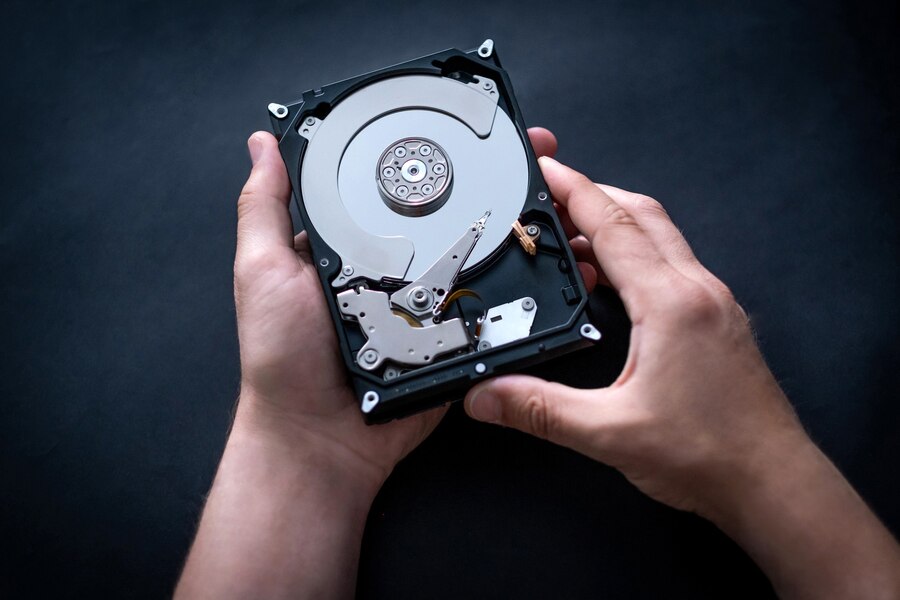The demand for effective and trustworthy data storage has never been higher than it is in the current digital era. Whether you’re a professional or an occasional user, choose the best storage option may have a big influence on how you use computers every day. Solid State Drives (SSDs) and Hard Disc Drives (HDDs) have long ruled the industry when it comes to digital storage. We’ll examine the main distinctions between these storage options in this blog article to assist you in choosing the best option for your digital storage requirements.
SSD vs. HDD: A Brief Overview
Two different methods of digital storage are represented by Solid State Drives (SSDs) and Hard Disc Drives (HDDs). Let’s investigate each technique more closely:
Solid State Drives (SSDs):
SSDs are a contemporary storage option that uses flash memory to store data. SSDs are more resilient and less prone to physical harm because they don’t have moving parts as standard HDDs do. They provide blazing read and write speeds, resulting in quicker system startup times and enhanced overall system performance. Thanks to their amazing speed and dependability, SSDs have won the hearts of many consumers.
Hard Disk Drives (HDDs):
HDDs have long been a mainstay of the digital storage sector. They use a read/write head and spinning platters to access data. Although HDDs are recognised for their inexpensive cost and large storage capacity, they tend to be slower than SSDs and are more prone to physical damage because of their mechanical components.
Let’s now examine a thorough comparison of these two storage options:
1. Speed and Performance:
The speed and general performance of SSDs and HDDs are two of their most notable distinctions. Both data access and transfer rates on SSDs are significantly quicker. This is so because reading and writing data doesn’t involve any moving elements. SSDs provide almost instantaneous access to data, which makes them perfect for operations like starting up your computer, running programmes, and loading files.
HDDs, in contrast, are often slower since they rely on the actual physical spinning of platters to retrieve data. This implies that as compared to SSDs, boot times and application load times are often greater.
2. Reliability and Durability:
When it comes to dependability and durability, SSDs have a certain edge. Since they don’t have any moving parts, they are less vulnerable to physical trauma than HDDs, which frequently causes data loss. SSDs are a safer choice for long-term data storage since they are also more durable over time.
HDDs are more vulnerable to damage from drops, shocks, and vibration because of their mechanical components. The performance of HDDs may deteriorate over time, perhaps resulting in data loss.
3. Affordability and Capacity:
HDDs have a long history of being popular due to their low cost and large storage capabilities. HDDs are an affordable option if you want a significant quantity of storage capacity without breaking the bank. Because of this, they are appropriate for jobs like storing media files, huge games, and backups.
While SSDs were once more expensive per gigabyte, they have since become more accessible. These days, they come in a variety of capacities that strike a compromise between speed and storage. You may select an SSD based on your needs for storage and financial constraints.
4. Noise and Power Consumption:
The amount of noise and electricity these storage systems use is another thing to think about. HDDs produce noise as a result of their moving parts, which can be annoying in a calm setting. Additionally, because they use more power than SSDs, laptop batteries may last less time when using them.
SSDs, on the other hand, are excellent for laptops and portable devices since they are quiet and use less power.
5. Lifespan and Endurance:
Some users may find it concerning that SSDs only have a certain number of write cycles before they wear out. In contrast, wear-leveling and TRIM technologies included in contemporary SSDs contribute to the increase in longevity of these devices. It is important to remember that SSDs often have a lifespan that is longer than the ordinary lifespan of a consumer’s PC.
HDDs do not have the same restriction because the deterioration of their mechanical parts mostly determines how long they last.
6. Portability:
SSDs are superior if portability is a factor. Because they have no moving parts, they are smaller, lighter, and less likely to be damaged during transit. Due to this, SSDs are a great option for external drives, whether you need a portable backup solution or you’re a content creator on the road.
HDDs are larger and thicker, which might make them less practical for people who need a portable storage solution.
7. Gaming Performance:
Gaming performance might be considerably impacted by the decision between SSD and HDD since gamers frequently have specialised storage demands. With quicker load times and less latency during gameplay, SSDs excel in this area. Games loaded rapidly when installed on an SSD, and the easy access to data can offer players a competitive advantage.
While HDDs are usable for gaming, depending on the complexity of the game and the hardware in your computer, they may cause longer load times and slight stutters.
8. Cost per Gigabyte:
It’s critical to think about the cost per gigabyte when comparing the cost-effectiveness of SSDs and HDDs. In general, HDDs and SSDs cost more money per gigabyte than one another. But as SSD technology gets more reasonably priced, the price disparity has been dwindling over time.
HDDs are unquestionably less expensive when evaluating the cost per GB. HDDs are the more affordable option if you want a lot of storage capacity at a reasonable cost and are ready to give up performance.
9. Backup and Redundancy:
SSDs can be more dependable in terms of data backup and redundancy due to their endurance and reduced susceptibility to physical harm. No matter if it’s an SSD or an HDD, redundancy should never rely only on a single disc. To ensure data protection and recovery in the event of drive failure, it is essential to implement a backup plan, such as routine data backups to an external drive or cloud storage.
10. Environmental Impact:
SSDs provide a number of benefits for customers that care about the environment. They help to lower energy usage since they use less electricity. Additionally, because there are no moving components, there is less heat and noise pollution with SSDs, making them a more ecologically friendly option.
HDDs are comparatively less environmentally friendly because to their increased power consumption and mechanical components.
11. Future Trends:
The world of digital storage is always changing. SSD technology is developing quickly, with gains in speed, robustness, and affordability. SSDs are anticipated to become more widely available and accessible as time goes on.
HDDs will still be an affordable, dependable storage option, especially for consumers who need a lot of storage capacity for backups and huge media libraries.
12. Operating System and Applications:
Consider putting your operating system and commonly used programmes on an SSD if you want to increase the overall performance of your computer. This may result in much quicker application launch times and boot times. HDDs, on the other hand, are better suited for the storage of huge items like documents, pictures, and movies.
13. RAID Configurations:
It is possible to employ many drives in a RAID (Redundant Array of Independent Discs) arrangement to boost performance, add redundancy, or both in some circumstances. RAID 0 arrangements, which combine the speed of many SSDs, are a common choice for SSDs. HDDs are frequently utilised in RAID 1 configurations for data redundancy since they are more economical for greater storage needs.
14. Noise Considerations:
SSDs are the best option because of their silent operation in settings where noise is an issue, such recording studios or home offices. HDDs can make audible noises when they spin and look for data, which can be annoying in quiet environments.
15. Upgrading Existing Systems:
A PC that is getting on in years might benefit from an SSD upgrade instead of an HDD. A cost-effective option to increase performance without purchasing a new computer is to update your existing computer, which currently has an HDD but has the capacity for an SSD.
16. Enterprise and Server Environments:
SSDs have grown in popularity in business and server contexts due to their speed and dependability. They are employed for operations requiring high I/O performance, such as hosting websites or managing databases. HDDs are nevertheless being employed in circumstances when massive volumes of inexpensive storage are needed.
17. Backup and Data Recovery:
It’s important to have a strong backup and data recovery strategy since both HDDs and SSDs might malfunction. Backup your data often to an external drive, network-attached storage (NAS), or cloud storage service to guarantee that you can retrieve your crucial files in the event of a disc failure.
18. Operating Temperature and Climate:
SSDs are less prone to severe temperatures and often operate well in a wide range of temperatures. High-heat or very cold settings may be difficult for HDDs, which can have an impact on both their performance and longevity.
19. Gaming Console Upgrades:
The internal storage of certain game consoles, including the PlayStation and Xbox, may be upgraded by users. In these systems, switching to an SSD can greatly speed up game loading. It’s a choice that gamers who value performance should think about.
20. Technological Advancements:
HDD and SSD technology are both still developing. SSD prices are dropping, and newer models have better performance and endurance. Innovations in HDDs include helium-filled drives that use less energy and less friction.
Conclusion:
The decision between an SSD and an HDD ultimately comes down to your individual requirements, preferences, and financial constraints. Our demand for effective and dependable storage solutions is growing as the digital era progresses. Understanding the advantages and disadvantages of each technology is critical whether you choose the speed and dependability of SSDs or the accessibility and huge capacity of HDDs.
To sum up, take into account the following elements while making your choice:
- The necessity for speed and performance.
- Budgetary requirements for data storage.
- Both portability and toughness.
- Usage in a game or for work.
- noise-related factors.
- Trends in technology and future-proofing.
- Particular use scenarios, such backups, external storage, or RAID setups.
Your computer experience in the digital era may be significantly improved by choosing the correct storage solution. To make sure that your digital storage capacities are optimised for your needs, keep up with current trends and developing technologies in storage. Decide which storage option best suits your goals and particular use case, whether it be SSDs or HDDs.


